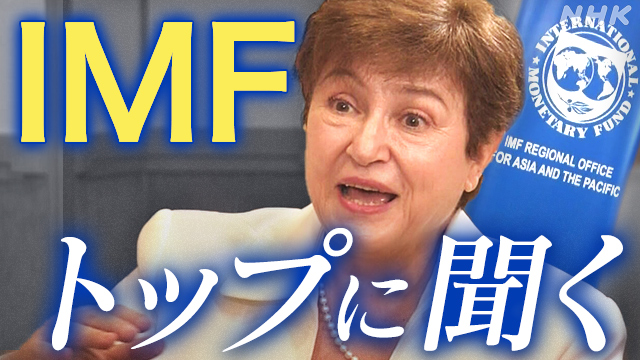A dark cloud in the world economy !? What the IMF top talks about July 21st, 13:12
The world economy has changed completely in the wake of Russia's military invasion.
Rising energy and food prices are accelerating, and there is growing concern in Europe and the United States that monetary tightening to curb inflation may slow economic activity.
In China, the economic slowdown has become apparent, and there is a dark cloud in the future of the world economy.
Under these circumstances, the head of the IMF = International Monetary Fund, Managing Director Georgiewa, responded to an independent interview with NHK in Tokyo on the 20th.
What did she say about the future of the world economy and the Japanese economy?
(Yuki Yamada, Reporter, Ministry of Economic Affairs)
Q: How do you see the future of the world economy?
● IMF Managing Director Georgiewa
Since the announcement of global economic forecasts in April, the cause of the downside risk has become clear.
Unfortunately, this downside risk has materialized and inflation has risen significantly.
China, in particular, saw a significant economic slowdown in the second quarter due to the impact of the new corona, increasing uncertainty about investment restraint.
Given this situation, we will lower our forecast for the growth rate of the world economy.
I recognize that there are dark clouds in the future.
Q: In the United States, we have decided to raise interest rates significantly in order to curb inflation, but it has also been pointed out that there is a risk that the economy will slow down due to monetary tightening.
● IMF Managing Director Georgiewa
The US monetary tightening is the right response, but I think the road to achieving price stability without falling into a recession is narrowing.
When the Fed tightens monetary policy, the economy cools, but the Fed's goal is to stabilize short-term inflation expectations, which the Fed is determined to do and communicates appropriately. I am.
For the United States, we expect positive growth this year and next, but lower than originally expected.
If the Fed gets even tighter, the economy could be tougher.
However, the foundation of the US economy is solid and there are no risks that would change dramatically.
Q: How will the US interest rate hike affect emerging economies?
● IMF Managing Director Georgiewa
Many of the emerging markets have built a strong foundation for growth over the years, accumulated funds and implemented monetary and fiscal policies to protect the economy from the shock of the new Corona. There is no doubt.
However, the fact that US interest rates are expected to rise in the future makes it even more difficult for emerging markets.
Many emerging economies have embarked on monetary tightening before the Fed.
As a result, emerging market finance is tighter than in developed countries, which is doing the right thing.
There are two points to assume.
One is that the spread of the new corona infection has raised the level of debt in emerging countries.
Having dollar-denominated debt is a combination of rate hikes and a stronger dollar, making the situation difficult.
Second, there are no major capital outflows, but in the six months of 2022, $ 52 billion of money has flowed out of emerging markets.
This is equivalent to the total inflow to emerging markets in 2021.
Thus, there are signs of a capital outflow.
The situation is exacerbated when capital outflows and high interest rates combine.
In such an environment, the materialization of downside risks can create a very difficult situation for emerging markets.
Countries such as Sri Lanka and Lebanon are already at the forefront of support programs.
Progress is also being made in Ghana, but I would like you to take action at an early stage.
If you run into problems, please work with us to reduce the risk.
Q: What are your thoughts on the future of the Japanese economy?
What are appropriate monetary and fiscal policies?
● IMF Managing Director Georgiewa
Let's look at Japan in a global context.
Although the shock of the new Corona and the impact of the military invasion of Ukraine have reached Japan, Japan is expected to maintain positive growth this year and next year by invoking monetary and fiscal policies.
That said, Japan's economic growth forecast has been slightly revised downwards this time, and Japan's inflation forecast has been revised slightly upward, but inflation levels in Japan are very low (compared to countries such as Europe and the United States). ..
Japan still predicts inflation to be below 2%.
For this reason, the Bank of Japan, which aims to stabilize prices, has the option of maintaining monetary policy.
The exchange rate has fallen (the yen has been depreciating) due to the Fed's monetary tightening, which is a natural reaction.
Japan has benefited from the weak yen and has many export opportunities.
It stabilizes the situation in Japan.
What is the most important thing for Japan?
Japan's low growth is due to vital statistics.
First, further investment in R & D and human capital is the right step to increase productivity.
Second, Japan has the role of expanding the labor market by increasing the attractiveness of women to work.
In Japan, women's wages are lower than men's, so I think we can not only make the labor market attractive, but also raise women's wages to address the problem of wage stagnation.
The IMF's outlook for global economic growth, which Georgiewa mentioned in an interview, will be announced on the 26th of this month.
How much downward revision will it be?
It will also be interesting to see how the IMF analyzes the background.
Hironori Yamada ,
Reporter, Ministry of Economic Affairs
Joined in 2006
Worked at Asahikawa Bureau and Hiroshima Bureau
Currently in charge of Cabinet Office and Ministry of Finance

